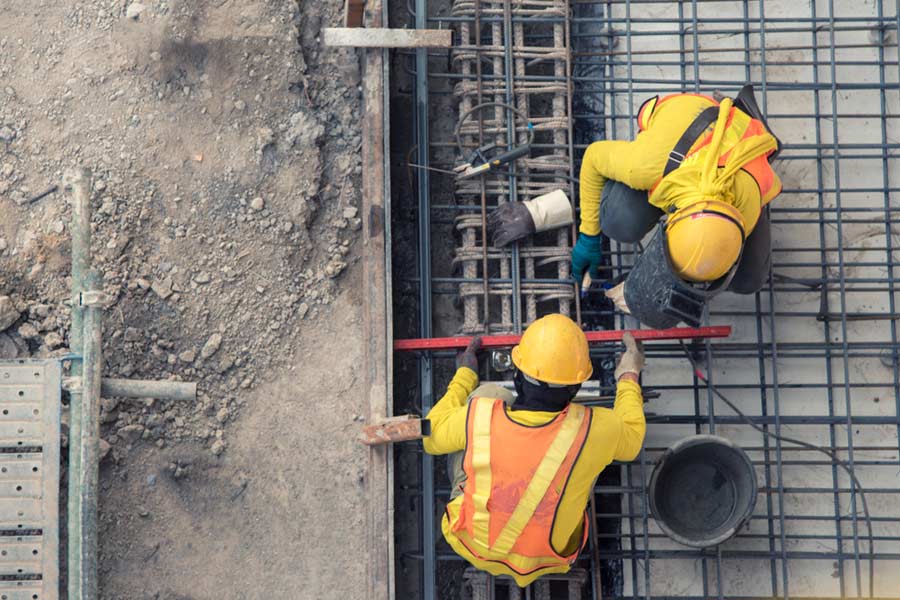The first batch of more than 60 workers from India have arrived in Israel under a government-to-government agreement to bolster the country's construction industry facing a huge shortage of trained hands.
The G2G mechanism has been worked out to keep away middlemen and to make the process of hiring fair through the screening tests conducted by Israeli examiners, who visited India a few times and coordinated the process with the Indian government agencies.
The first batch of Indian construction workers arrived in the country on Tuesday evening.
"Today we had a farewell event from the first batch of 60+ Indian construction workers going to Israel under the G2G agreement. This is an outcome of hard work of many, including @NSDCINDIA. I’m sure that the workers become 'ambassadors’ of the great P2P relations between India and Israel," Israel's ambassador to India Naor Gilon posted on X on Tuesday.
Earlier, a little over 900 construction workers had arrived from India during the last few months through the B2B route, involving manpower agencies in both countries.
Construction industry sources expressed dismay at the slow pace saying that after three months during which over 20,000 foreign workers from India and Sri Lanka were approved for jobs in the construction sector through screening tests conducted by the Israeli Contractors Association (ICA), only about a 1,000 workers had arrived so far.
They blamed the "bureaucratic procedures" that included obtaining various permits from the governments for the long delay.
Most of the selected workers are said to have resigned from their jobs and are said to be waiting to receive a visa to work in Israel, they said.
"The Israeli government has repeatedly reported its intention to speed up these procedures but has not done so," a source told PTI.
All stakeholders in Israel are said to have proposed several plans to fast-track the process in their discussions with the government.
"The task assigned to us by the government was carried out at a record pace. It has been weeks since we completed three rounds of selection of workers in which professional approval was given to employ over 20,000 workers, half of them in the government track and half in the business track," the Israel Contractors Association told PTI.
"We call on the government to act immediately to bring here the workers who have already (been) approved and to create a fast track for the approval and flight of the workers here. The delay in the arrival of the workers from India and Sri Lanka hurts all concerned," it said.
Israeli Prime Minister Benjamin Netanyahu during a telephonic conversation with his Indian counterpart Narendra Modi in December last year had discussed advancing the arrival of Indian workers to Israel.
The Israeli construction industry employs workers in specific fields where there is a lack of Israeli workers.
The largest group of about 80,000 workers in the construction industry came from the Palestinian Authority-controlled West Bank and another 17,000 from the Gaza Strip, a huge majority of whom had their work permits revoked following Hamas' brutal attack on Israel in October.
Another group of about 7,000 workers in the sector have come from China and some 6,000 from Eastern Europe.
Israel's Minister of Economy Nir Barkat during his trip to India in April last year, had spoken to officials and his counterpart in New Delhi about hiring Indians in various sectors, including in the construction sector, much before the current escalation.
The discussions had revolved around bringing in almost 160,000 people.
About 18,000 Indians are working in Israel, mostly as caregivers. Most of them decided to stay back in Israel and did not leave the country during the war because "they felt quite secure" and "also because the salaries are quite attractive".
Israel and India also inked an agreement in May last year during then Foreign Minister Eli Cohen's visit to New Delhi that will allow 42,000 Indian workers to work in the Jewish state in the fields of construction and nursing, a move that would address the rising cost of living and assist thousands of families waiting for nursing care.
A statement released by the Israeli Foreign Ministry then said that 34,000 workers would be engaged in the construction field and another 8,000 for nursing needs.
About 800 workers from India have also joined the agricultural sector in Israel during the past six months.
Except for the headline, this story has not been edited by The Telegraph Online staff and has been published from a syndicated feed.











